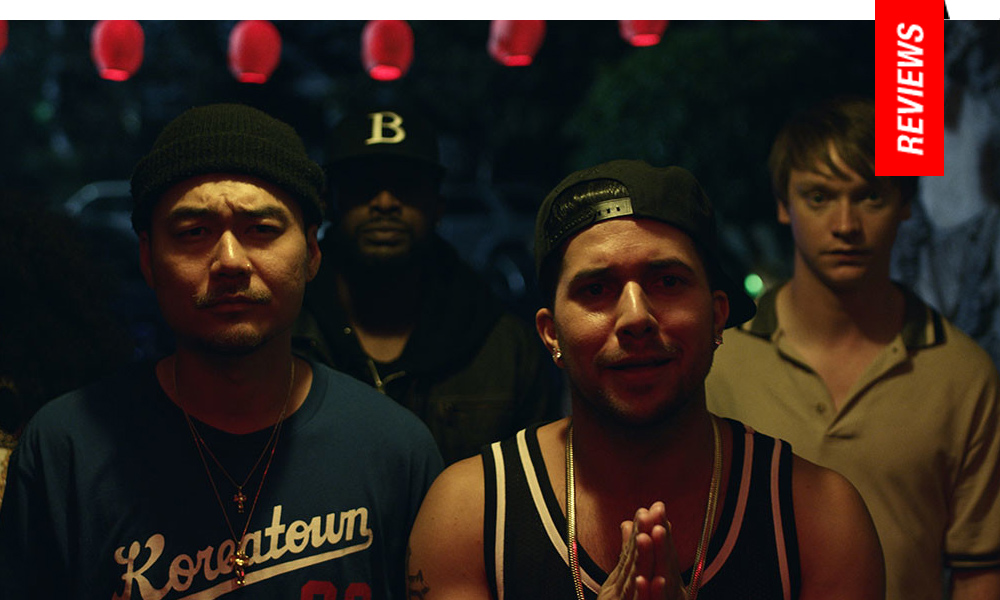Shock the Body Electric: Kahn Addresses Pertinent Isms in Provoking Comedy
UC Berkley student Adam (Calum Worthy) has something of an axe to grind considering he’s following in the footsteps of his father (Anthony Michael Hall), a celebrated Berkley literature professor who waxes magnificently on Dostoevsky. Pursuing his thesis on the linguistic and stylistic uses of the ‘N’ word in battle rap, Adam becomes inveigled with celebrated SoCal rapper Behn Grymm (Jackie Long) despite the polite protestations of his girlfriend Maya (Rory Uphold, struggling through some of the film’s most chewy passages of dialogue), a staunch feminist more than happy to point out the extreme homophobia, transphobia, misogyny and racism which are all tenets of a successful battle. When Adam has the surprising opportunity to battle rap with another white cohort who accosts Grymm in the parking lot, he proves he has a knack for it, despite tentatively holding back on the racial epithets proliferating in his head. Eventually, his pure-bred political correctness falls to the wayside under the tutelage of Grymm, a relationship which eventually finds both men examining their personas in unexpected ways.
Boiled down, Bodied is another All About Eve (1950) story re-defined by the problematic, and oft-downplayed subject of cultural appropriation. Behn and Adam are locked in an uncomfortable dance of mentor and protégé (much like Margo and Eve), master and amateur of one uniting, revered craft. And as such, Behn’s Pygmalion becomes an all-devouring monster (even if Kahn’s narrative attempts a convenient ‘united front’ in the third act, another element which sometimes makes Bodied seem more like a cynical, self-loathing byproduct of whitewashing rather than a formidable castigation of it).
Not unlike Geremy Jasper’s 2017 feel-good melodrama of cultural appropriation, Patti Cake$, Kahn uses a central white character as a conduit for determining what are the overriding factors of a ‘culture vulture.’ The usual suspects are fileted appropriately in the catty dialogue, with Iggy Azalea, Macklemore, and even Eminem reviled or praised for their prominent, occluding presence in hip-hop. But then, Bodied also fails to praise those who have been overlooked in the shadows of these white artists who were (or continue to be) more successful than black originators—and thus, perhaps inadvertently gives white accomplishments (and failures) more weight. Furthermore, Bodied seems like the ripe moment to discuss the differences in portrayals of white vs. black alums in the hip hop universe. For instance, the reverie and celebration which greeted something like 8 Mile (2002) vs. Curtis ’50 Cent’ Jackson’s similar move in 2005’s Get Rich or Die Tryin’.
Worthy usurps center stage, despite some careful character development for the sympathetic Behn Grymm, who is well played by Jackie Long. It is a bit taxing, however, to follow Worthy’s character arc from suspiciously progressive ally to full-blown systemic blight, even if Kahn dares us to challenge our sympathies. Several supporting players stand out while Kahn makes decent use of some stunt casting “The Breakfast Club” luminary Charlamagne Tha God as emcee Hunnid Gramz.
However, to its credit, it is also the white characters of Bodied who are painted in cartoonish strides, not unlike a similar juxtaposition in this year’s earlier The First Purge, which highlights how privilege creates a vacuum of out-of-touch pretense and tone-deaf approximations. Rueful in how it paints the hypocrisy of the white student body of a progressive liberal arts college (some of the more successful exchanges between two white characters happen to be Worthy and Anthony Michael Hall), this still falls short when compared to something as extravagantly and gracefully on point as a Justin Simien with both his narrative and television series Dear White People. Conversations about what kind of white person under what circumstance can use the ‘N’ word is somehow less disquieting than something like James Toback’s Black & White (1999).
Belabored and in need of some tangential edits (failing to properly address the problematic racist tendencies of the white queer community, for instance) Bodied may be more than the sum of its parts but could have potentially been more gutsy As far as a snapshot of the world of battle rap, however, it won’t be long until Bodied feels as anachronistic as Eminem and Curtis Hanson’s 8 Mile.
★★½/☆☆☆☆☆
